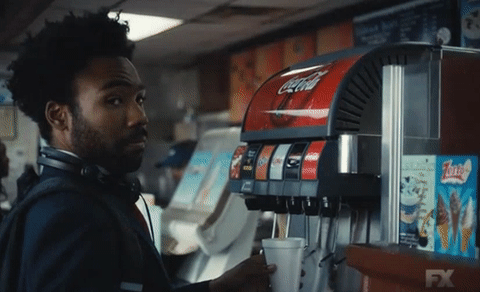CHRIS REVIEWS: Atlanta (season one, 2016)
/Hello, readers. Every once in a while, we publish a selection from a monthly newsletter Chris writes for Storyological patrons called, CHRIS REVIEWS EVERYTHING. If you'd like to receive this newsletter, and support Storyological in the process, visit our Patreon page to sign up.
In a horror film, the world is a safe place violated by the presence of a monster. In Atlanta, the world is a scary place where anything can happen.
I read something the other day. Perhaps around the time of Philip Roth’s death. This thing that I read discussed the end of realism. Realism here defined as the reality of, for the most part, white men. I suppose it's easy to imagine the world to be a rational place when you feel in control of everything.
Atlanta, as imagined by Donald Glover, is a very strange sort of place. There are the familiar emblems of drugs and rappers, I suppose, for anyone who pays a passing glance to the news and its stock characters and stereotypes, but there are, too, elements of surpassing surrealism and straight-up horror. It is a funny, scary, and sweet show. Anything can happen. A dude might mow down some folk in a parking lot with his invisible car. A gathering of rich black folks at a fancy house might accurately be described as a Spike Lee directed version of Eyes Wide Shut. There’s that one guy on the bus eating a sandwich in a way that doesn’t seem quite right. Earn (Donald Glover) and his friends sometimes hang out on a sofa in an empty field, as if the entire city were their living room.
The show revolves around Earn and the people who revolve around him. There's Vanessa, his sort of girlfriend and baby momma. There's his new boss, the up and coming rapper Paper Boi. And there's this one friend of Paper Boi, the lanky and charming, Darius, who appears, at all times, to be communing with some deeper, or at least off-kilter, level of reality.
Occasionally, the show takes off at a run into the realm of satire. One episode is done entirely in the style of the BET talk show hosted by Tavis Smiley. It features a 13-year-old black kid transitioning to a 35-year-old white man. It is slyly political, winking, weird, and funny.
Earn is, as he likes to say, technically homeless. He has a child with Vanessa, but they don't live together. Nor does he live with his parents who, we see early on, no longer trust him. They seem to have kicked him out back in the day. It's not until the end of the first season that we find out where Earn sleeps. From our point of view, he has spent the whole year avoiding going home.
Atlanta reminds me of, among other things, The Florida Project, Louis, and Get Out. Perhaps, with a small dash of the British show, The Mighty Boosh, thrown in. Much like Louis, the world feels both entirely real and totally out of control. Whereas Louis, though, has only himself to blame, who should we blame in Atlanta?
Earn? Perhaps.
Whiteness? Probably somewhat.
But, also, neither and both and everything.
The show often seems apolitical, until it snaps—generally with a deadpan comment from Earn about something like the realities of slavery—into a clear-eyed indictment.
There's this one line from Clarice Lispector’s The Passion According to G.H. that functions, I think, as a fairly good description of both the surrealism and politics of Atlanta.
“I am being so direct as to seem symbolic.”
In the ninth episode, during one scene, the camera hovers directly behind Earn’s head. This point of view renders him faceless. It also confuses the very idea of point of view, as we tend to feel, in this position, that we are entirely in Earn's point-of-view and yet we can't (and, therefore, in a way, neither can he) see what’s right in front of him.
This point-of-view actually crops up a few times during the season.
It is the point of view of tragedy--of fate. The opposite of horror.
In a horror film, the world is a safe place violated by the presence of a monster. In Atlanta, the world is a scary place where anything can happen. There isn’t any room for horror in either heaven or hell.
In a world that doesn’t make any sense, in a relationship that seems confused at best, there are still those moments when things seem like they might turn out okay. Particularly when, such as late in the season, Van and Earn sit together on the couch and watch TV. It is a scene of great intimacy and warmth and, for a moment, it seems like the ideas of home and family might rescue Earn from his fate. But Earn himself doesn’t seem to feel like he belongs to these moments. Even when Vanessa says he can stay, he leaves.
There's this exchange from a play by Bernard Shaw that I thought about a lot while watching Atlanta. I first discovered it as the epigraph to The Outsider by Colin Wilson. Here is that exchange:
Keegan: You feel at home in the world then?
Broadbent: Of course. Don't you?
Keegan (from the very depths of his nature): No.



